I keep getting the question, “Is stress causing my digestive distress?” And it’s a legit question no doubt.
Stress and Digestion
You don’t think they can be related.
But, in fact, they are.
According to Harvard,
The relationship between environmental or psychological stress and gastrointestinal distress is complex and bidirectional: stress can trigger and worsen gastrointestinal pain and other symptoms, and vice versa.
Basic Anatomy
Let’s start by referencing another post, Endocannabinoid System and Your Gut.
- The gut and brain communicate with each other, mostly via the vagus nerve, but also via the body’s endocannabinoid system (ECS).
- The ECS (endocannabinoid system) is involved with digestive motility, nausea, intestinal inflammation, gut permeability, cancer cell proliferation, and complex interactions with probiotic bacteria of the intestines.
That post refers to a basic anatomy fact, the enteric nervous system (or ENS).
The enteric nervous system (ENS) is a web of sensory neurons, motor neurons, and interneurons embedded in the wall of the gastrointesinal system, stretching from the lower third of the esophagus right through to the rectum.
Knowing those simple facts, it becomes a little easier to see the direct correlation between stress and digestion; brain and gut.
So much of what happens in the brain affects what happens in the gut.
In fact, think about something as simple as what happens the moment you think of eating your favorite food.
Your mouth begins to salivate. The mind instantly thinks the stomach is hungry (at the very least an intense craving comes on).
This is part of the digestive process, which begins before food even touches your mouth. The brain begins to anticipate food coming, producing saliva (approximately 1-1.5 liters of this liquid is produced daily).
So if the brain is where it starts, then what happens if you are completely stressed prior to that first bite?
Stressed Out
But stress is likely not what you believe it to be.
Our bodies endure multiple stressors each day.
When we think of stress we tend to automatically think of stress in these ways:
- Work is overwhelming. I’m stressed.
- My car just broke down. I’m so stress.
- Did I pack everything for the kid’s lunches tomorrow?
- How am I going to have that tough conversation?
Normal Stress
And yes, those are “normal stress” events.
In fact, many of the below would also be considered normal stress.
However, true stress is so much more.
What is Stress?
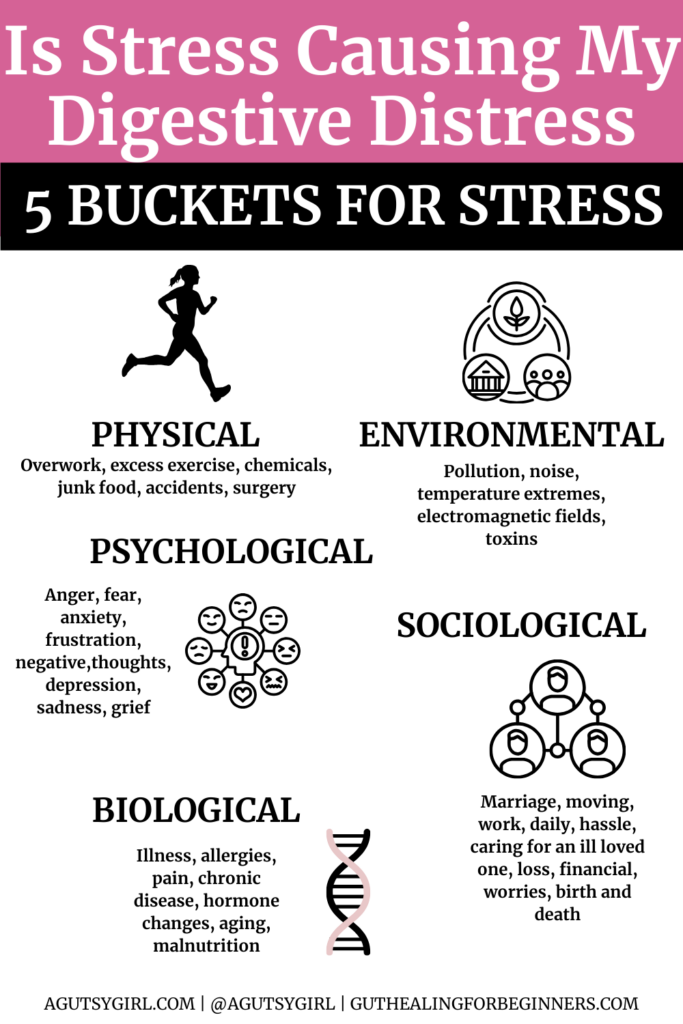
Stress can be placed into five main buckets, which include:
Physical
Overwork, excess exercise, chemicals, junk food, accidents, surgery
Environmental
Pollution, noise, temperature extremes, electromagnetic fields, toxins
Biological
Illness, allergies, pain, chronic disease, hormone changes, aging, malnutrition
Sociological
Marriage, moving, work, daily hassles, caring for an ill loved one, loss, financial worries, birth, death
Psychological
Anger, fear, anxiety, frustration, negative thoughts, depression, sadness, grief
(Taken from The Whole-Food Guide to Overcoming Irritable Bowel Syndrome by Laura J. Knoff, NC)
Is Stress Causing My Digestive Distress?
Click HERE to save this post for later.
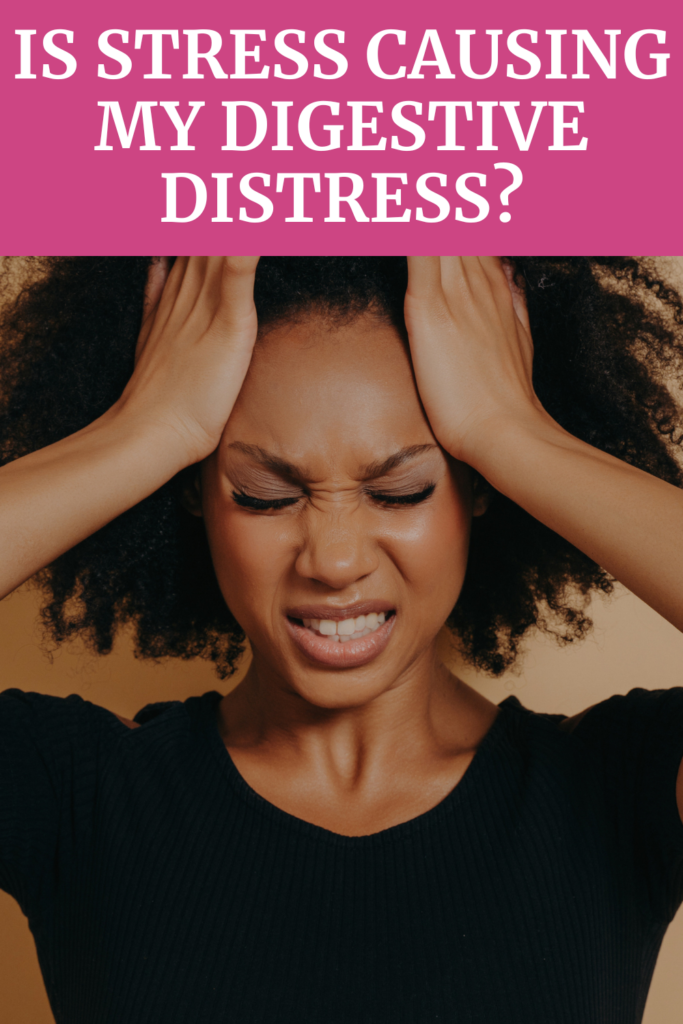
With all these daily stressors, of course stress could be causing or worsening your digestive distress.
Sometimes I have people say to me,
I’m not eating anything different, but I’m still flaring up.
After looking at their various current lifestyle factors (because remember, this isn’t just about food!) it becomes apparent that stress could be the current flare-up cause.
Any number of things may be acting as “the straw that broke the camel’s back.”
In fact, stress – any and all kinds – are part of the third pillar for A Gutsy Girl’s 3 Pillars for Ultimate Gut Healing.
It’s the third pillar, lifestyle, and it is, by far, the most difficult pillar to conquer.
Can I Get Rid of Stress Completely?
Once it’s fully understood that stress can and does cause digestive distress, the next thing everyone wants to know is,
Can I completely get rid of my stress?
And the answer is, “No.”
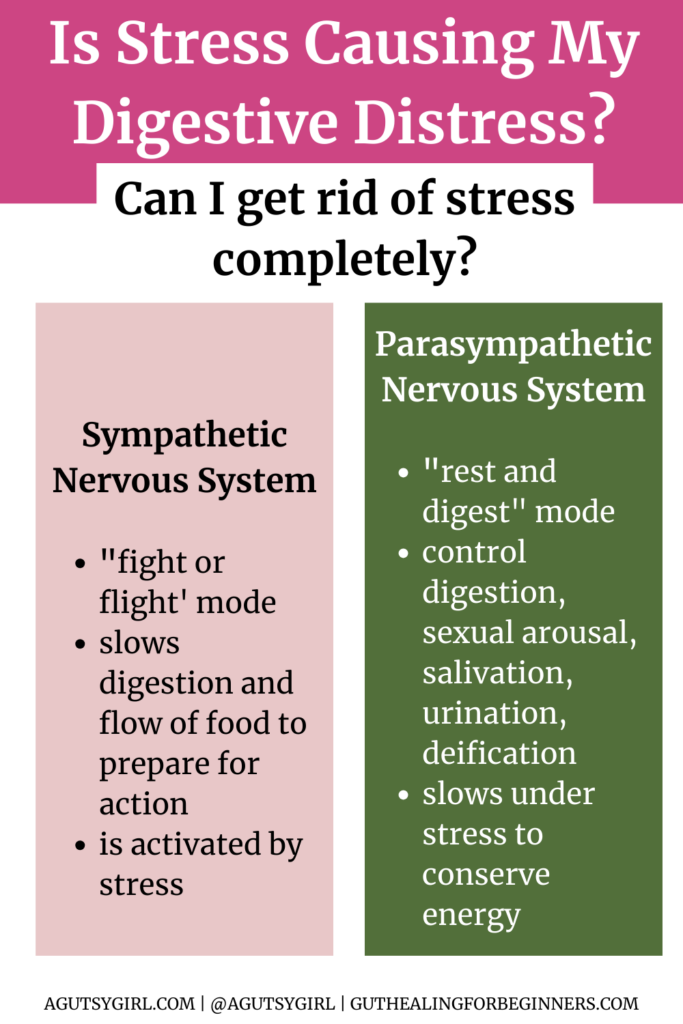
But, in fact, not all stress is even harmful.
There are two forms of stress: acute stress and chronic stress.
- Acute stress: short term – helps with focus and performance
- Chronic stress: long term – can damage health
The stress that is harmful is, of course, chronic stress.
When the body is under chronic stress, the sympathetic nervous system is activated too often.
Here is brief information on the sympathetic and parasympathetic nervous systems.
Sympathetic Nervous System
- “fight or flight’ mode
- slows digestion and flow of food to prepare for action
- is activated by stress
Parasympathetic Nervous System
- “rest and digest” mode
- controls digestion, sexual arousal, salivation, urination, deification
- slows under stress to conserve energy
[I have a whole post around this fight or flight mechanism. Read more about it HERE.]
When the body is under this chronic stress, more than digestive distress occurs.
According to the Institute for Integrative Nutrition and the Gut Health Course, here are 10 (digestive) consequences of chronic stress.
10 Digestive Consequences of Chronic Stress
Click HERE to save these for later.
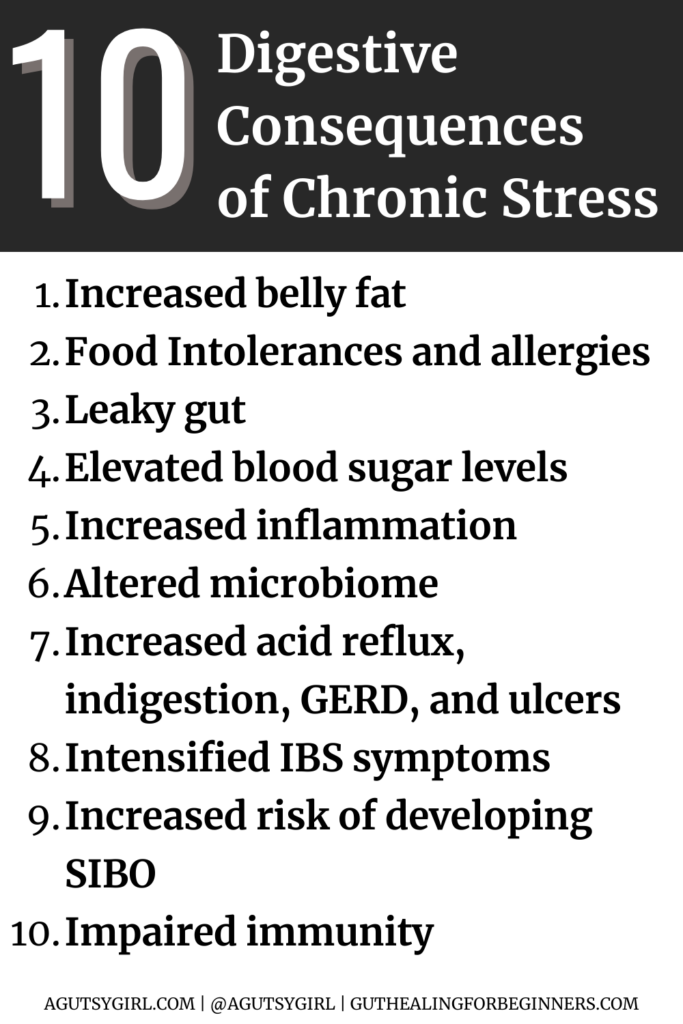
- Increased belly fat
- Food intolerances and allergies
- Leaky gut
- Elevated blood sugar levels
- Increased inflammation
- Altered microbiome
- Increased acid reflux, indigestion, GERD, and ulcers
- Intensified IBS symptoms
- Increased risk of developing SIBO
- Lowered immunity
So how do you know if you’re actually under stress? And how can you manage it?
23 Stress Symptoms
Here are 7 stress symptoms:
- Acne. Gut-brain-skin.
- Easily agitated. Are you on edge and snapping more than usual?
- Feeling overwhelmed.
- Having difficulty relaxing and calming/quieting the mind.
- Avoiding other people.
- Chronic anxiety.
- Decreased energy. The effects of too much stress can be draining.
You can grab all 23 HERE.
I have ample ways to manage stress.
You can start with THESE 8 stress management tactics.
To be honest, though I have already written a ton about stress and managing it, there is still so much more to share.
Please leave a note for me in the comments below if I can help address any other aspect of it for you.
Your Stress-Reduction Goal
Your goal is to identify as best you can the root to any and all stress.
Listen to your body to know if something is truly acute stress or if it has become chronic.
Though removing it completely is not likely an option, if you want to heal your gut, you’ll focus on reducing any and all chronic stress.
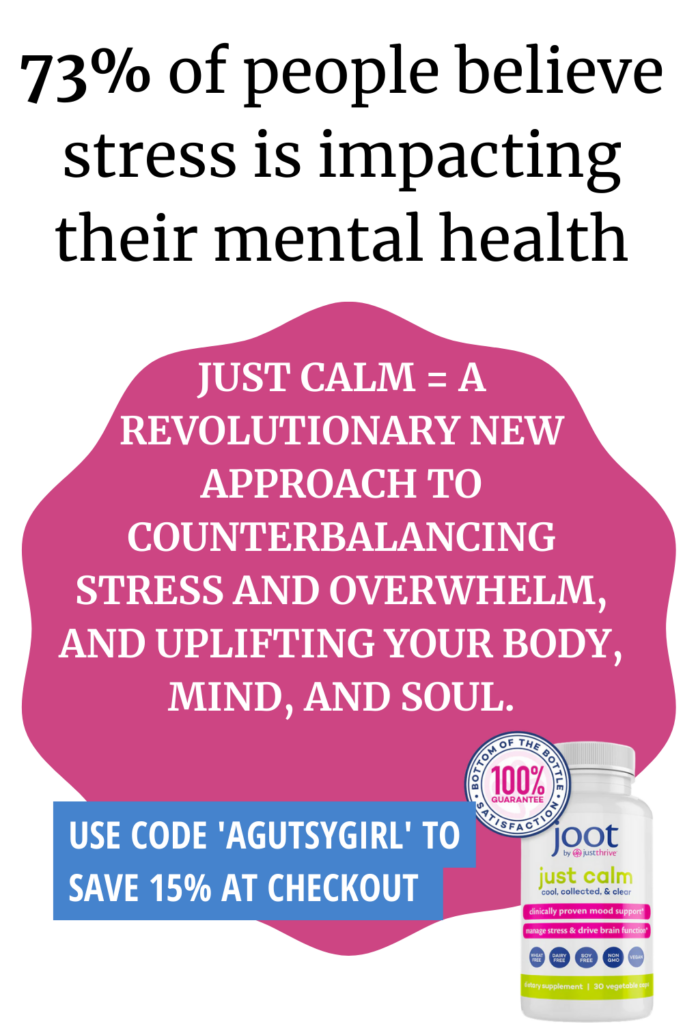
Get help in reducing stress.
Cool.
Collected.
Clear.
If you liked this post, you might also enjoy:
- Endocannabinoid System and Your Gut
- Vagus Nerve Stimulation
- The Importance of Shifting from Stress to Happiness
Xox,
SKH
🤰 bloating be gone! weight loss through optimal gut health for women
💃ʜᴇᴀʟ ʏᴏᴜʀ ɢᴜᴛ. ʜᴇᴀʟ ʏᴏᴜʀ ʟɪfe.
🫶🏻 founder gutbyome.com

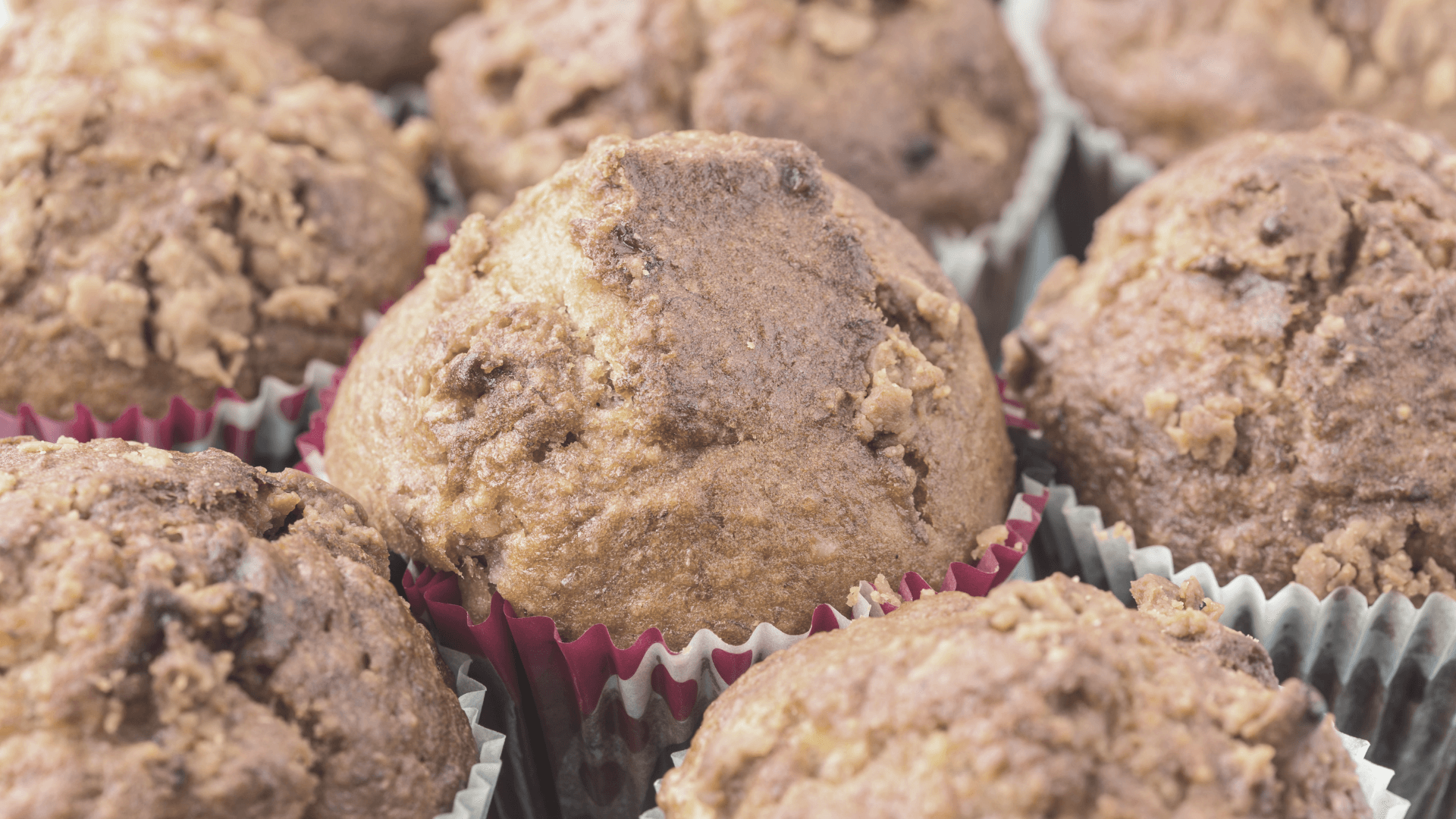
![A Gutsy Girl Update [almost 2025]](https://agutsygirl.com/wp-content/uploads/2024/11/2025-featured.png)

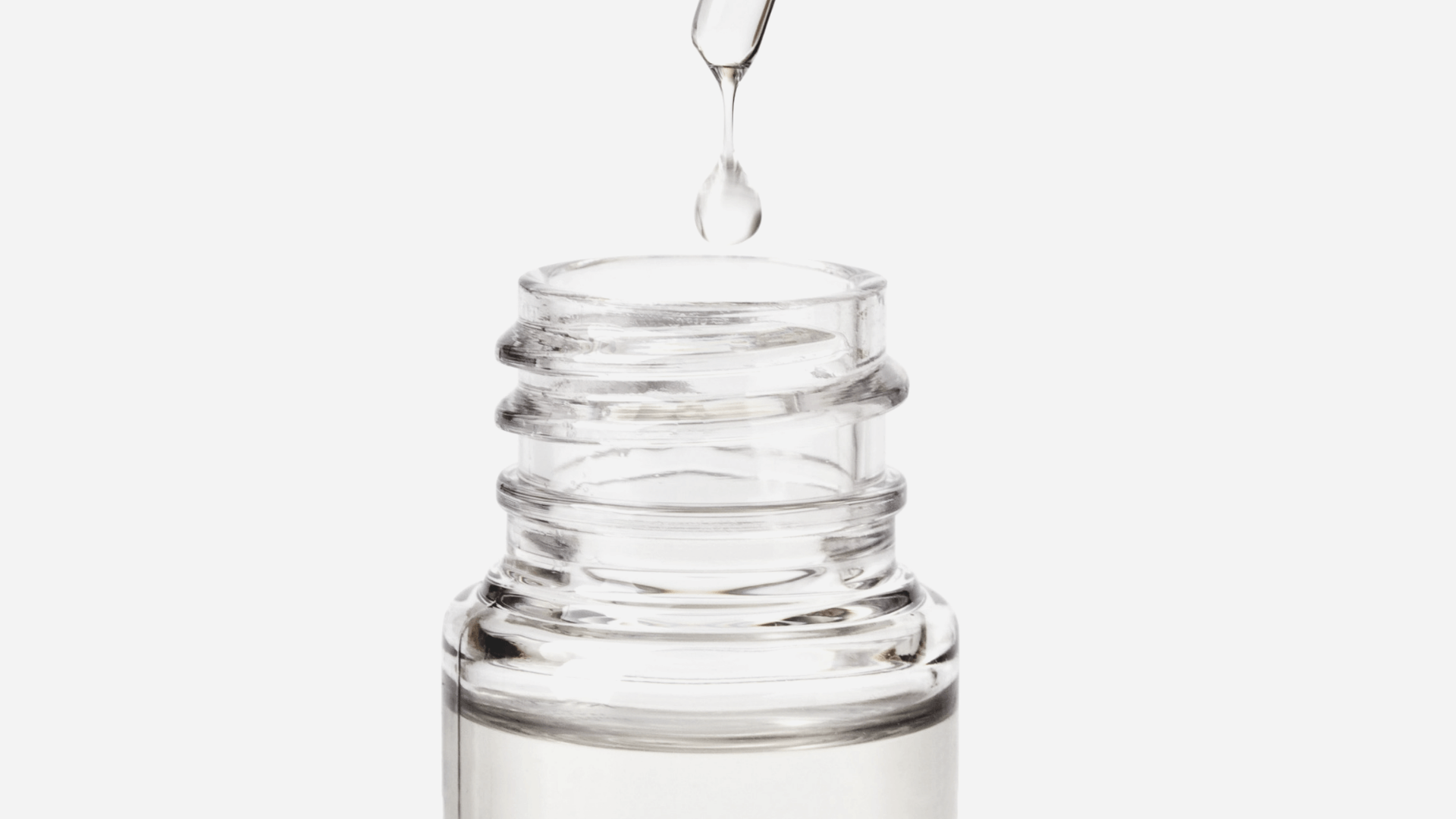

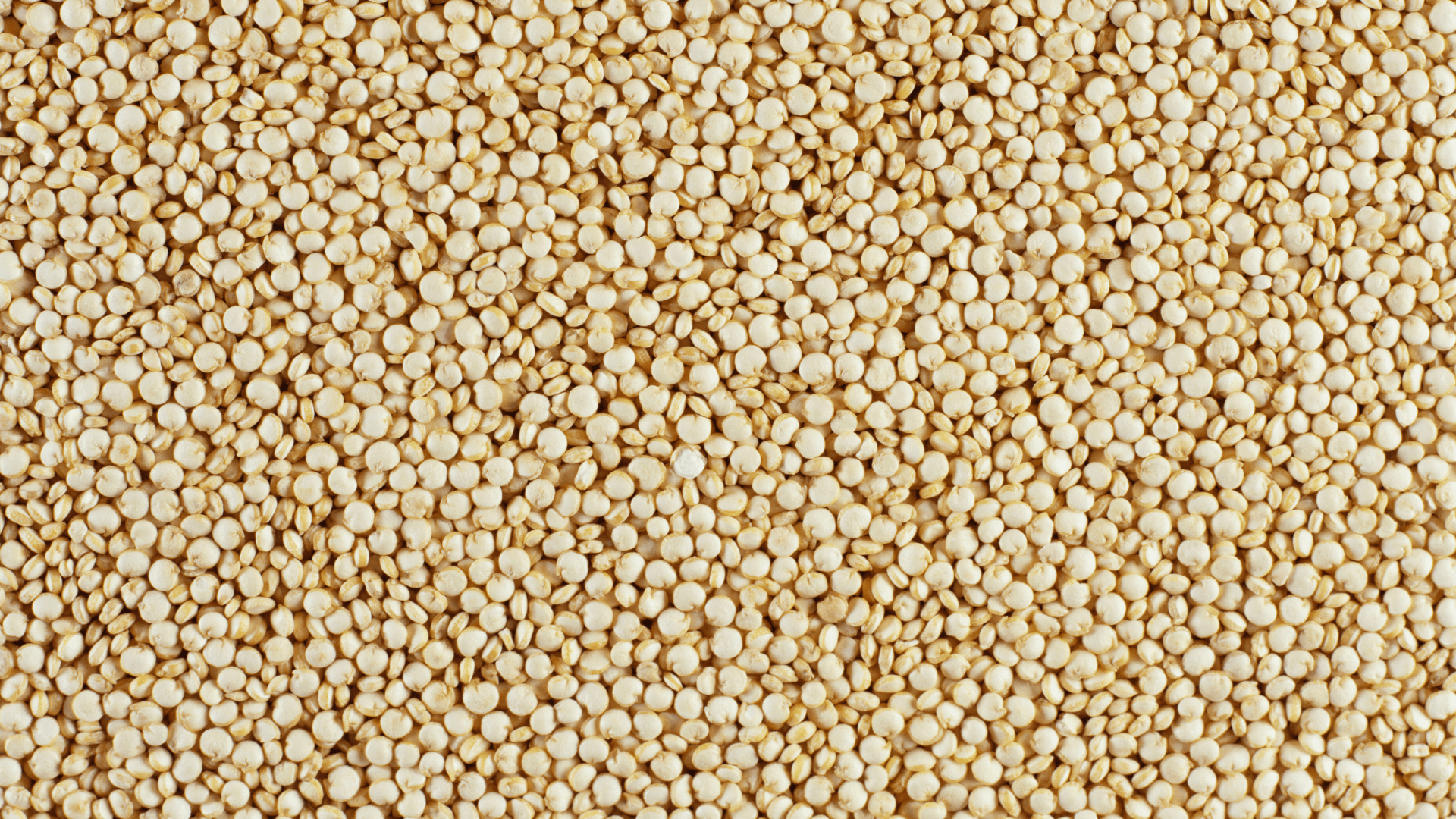
I would love to break up with stress, haha! Great image. There’s no denying, for me, that stress exacerbates symptoms for me… which then stresses me out… vicious cycle. And all the more reason to take care of ourselves. 😉
Right…take care of YOU:)
My stomach has been off the past few days. I’m eating more healthy – I like to say I’m allergic to being healthy. But maybe it’s stress. Subliminal stress though, because I”m a pretty care-free person. Sigh. I just want my stomach to feel back to its normal self.
Hi Nancy! There are so many factors that play into the digestive system. It’s been a long journey for me, but the puzzle has been worth piecing together. Yours might not be only food, but another factor that has nothing to do with stress?
I’ve totally heard of this being a big problem…stress is so evil in the health problems it causes!
Right! It does much more damage than we know!
Our health depends not on how much stress is in our lives but how we react and deal with stress in our lives. Do you fixate on the stress, or try to ignore it completely? Neither are good coping skills to reduce the stress response. Change what you can and let go of things you cannot change. Practice skilled relaxation daily to train yourself to relax at will. Practice self love.
Great thoughts, Laura! Thanks for stopping by. Enjoy your day!